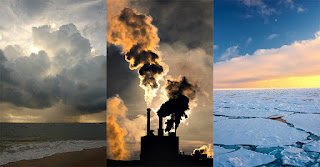Climate change has been without a doubt one of the most
talked about and controversial topics over the past decade. This week’s
assignment asked us to take a closer look at the topic and human involvement
from both sides, the scientific side, backed by data, and the side of the
nay-sayers and the root of their beliefs.
The short answer is yes. Although it doesn’t seem like it,
there is overwhelming evidence to prove that the current climate is indeed
changing. Per the UN, the average global temperature increased by 0.6 °C during
the 20th century, with numbers still rising. The temperature
increase is directly linked to rising levels of greenhouse gases like carbon
dioxide (CO2). These gases absorb infrared radiation and change the
natural flow of energy. The effects of the rising temperatures can already be
seen. Glaciers, sea ice, and permafrost are melting. In Southern California,
the drought continues due to lack of rain and longer, hotter days. And in other
parts of the country there is massive flooding. There is definite evidence to
show that the climate is currently changing.
How have humans contributed?
Since the industrial revolution, the demand for fossil fuels
has increased dramatically. Burning fossil fuels is the largest contribution to
the rise in carbon emissions in our atmosphere. But studies show that it’s not
just humans burning fossil fuels that contribute to climate change, other
activities do as well. Agriculture/animal culture is a big player in this game.
First, land must be cleared to prepare for livestock, chickens, produce etc…
Deforestation removes our natural CO2 filters. Second, emissions
from activities include methane and nitrous oxide. Studies show that methane is
a more powerful greenhouse gas than carbon dioxide. We also indirectly generate
ozone in our lower atmosphere with car exhaust fumes, other chemicals, and
something we unfortunately can’t avoid…sunlight. So again, there is
overwhelming evidence that links human activities to climate change.
How does this affect society?
Climate change is very much a social justice issue. Climate
change will affect everyone, but the impact may go unnoticed in certain parts
of the world and may be devastating to others. So not everyone will be affected
the same. Food shortages are expected at the local but not global level.
Weather pattern changes will affect water distribution. Some areas will lack
access to water while other areas will flood. Physical infrastructure will be
impacted affecting the economy. Climate change may have direct or indirect
effects on human health whether it be malnutrition or disease. People in
developing countries and people of low socio-economic status are especially
vulnerable.
What about the near future, the next 50 years?
If we continue our current path and do nothing to change the
situation, we could be looking at a different world. I imagine colorless
oceans, and by that, I mean the loss of coral reef ecosystems. Increasing sea temperatures and ocean
acidification is leading to massive coral bleach events. If we don’t do
something to stop this, coral reefs could be gone, forever. But it’s not just
oceans, it’s everything else. Long hot days doesn’t sound too appealing. Aside
from the hot days, lack of green scenery (at least here), increasing health
issues, and colorless oceans, I see war and conflict between the people who
demand change and those who don’t. Climate change goes beyond science and
physical change.
The Nay-Sayers
Most of the world is in agreement that climate change is
real and is happening as we speak. But there are some who disagree despite the
overwhelming evidence that proves it. Heartland Institute is probably one of
the most recognizable anti-climate change organizations out there. But I can’t
put my finger on exactly what they base their beliefs on. One thing that comes
to mind is Logical Fallacies. Their
stance seems to be based on what people might want to hear or what might seem
logical is absolutely backed by nothing. They claim to base their views off what
the data shows, but clearly that doesn’t seem to be the case, or there is a
misrepresentation of scientific data, showing only the portion that benefits
them to support what they are saying instead of being factual and showing the
entire picture.
.
It all boils down to climate change is real… but messy and
slightly terrifying!



No comments:
Post a Comment